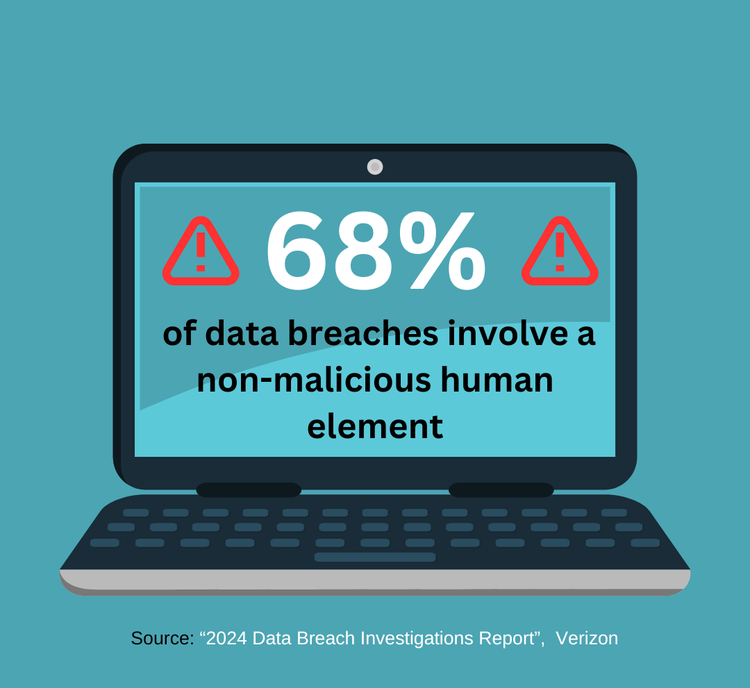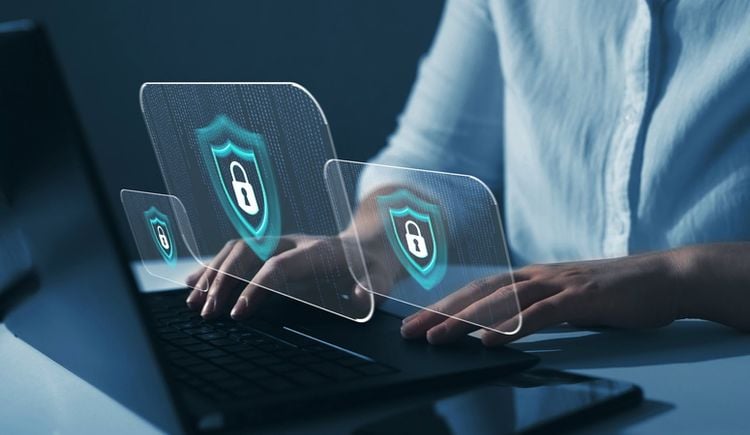ERP Security: 8 Best Practices to Secure Sensitive Data
While enterprise resource planning (ERP) software provides many useful benefits to workplaces of every size across every industry, these systems can open up your company to cyber threats like data breaches.
How to Secure an ERP System
To optimize your online safety and reduce system vulnerability, consider these 8 cybersecurity best practices to secure your ERP:
- Control User Access
- Use Employee Knowledge
- Implement Multi-Factor Authentication
- Talk to Experts
- Regular Updates and Support
- Ground the Cloud
- Balance Complexity
- Remain Compliant
ERP Security Best Practices
Human error can lead to security risks even if you have the best ERP on the market. In 2024, a study by Verizon found that 68% of data breaches involved a non-malicious human element. Phishing attacks are another way unwanted parties can access company data. These attacks can quickly spread if even one person opens a suspicious email. Human error will, unfortunately, always play a part in ERP security.
1- Control User Access
One key security feature offered by ERP systems to combat this is role-based access control (RBAC). This limits what different users access based on their roles within the company, such as management positions or departments. Another option is to implement Separation of Duties (SoD), in which all transactions require multi-factor authentication to confirm. We will touch on multi-factor authentication later.
Another method for securing ERP software would be enabling field-based access. This method is similar to the both RBAC and SoD. However, it allows system administrators to control user access at the software field level. It will assign create/read/update/delete (CRUD) privileges to every field in the program and be dynamically assigned for each individual user. Essentially, field-based security enables complete control when it comes to who can do what in the software.

2 Use Employee Knowledge
While employees can be a liability of human error, they can also offer security solutions. After all, your employees know best what works and what doesn’t in your day-to-day operations. Enlist these users to get their input on important issues, including security.
Consulting with users may take additional time, but it’s well-spent if you can identify potential security concerns in advance. Checking in with the dev team might reveal an unconventional account code structure which might become a liability when integrated with a new software.
3 Multi-Factor Authentication
One of the easiest ways to add an extra level of security to an ERP would be to integrate multi-factor authentication methods. Muli-factor authentication requires users to provide multiple forms of identification outside of the standard username and password combination. This can include extra security at login, including asking who their favorite pet is, or something else only unique to the user. Otherwise, multi-factor authentication can include things unique to a person’s identity, like fingerprints, facial recognition, or requiring additional confirmation from a trusted email.
By implementing muli-factor authentication, you can significantly reduce the risk of unauthorized users since access is only granted if all factors are verified. It also helps combat common security attacks like phishing and password guessing since it adds an extra step in the log in process. It also does not require a large investment or time to implement.
4 Talk to Experts
Most companies only need to buy or subscribe to a new ERP after significant growth, budget changes, or other factors. Some businesses have gone decades with the same legacy ERP system. When it’s time to find something new, there can be a lot of questions about how to do it affordably, efficiently, and safely.
Fortunately, ERP vendors can answer those questions for you. They can assist with securing your new system, whether that’s through installing new servers, utilizing permissions to access the operating system, or providing thorough risk identification and mitigation training to your employees. They may even offer customized modules to fit your security policies.
5 Regular Updates and Support
Automatic updates can keep your ERP operating at peak capability. However, missed updates can actually leave you vulnerable. Even a short delay, such as waiting a few hours to finish compiling data, can make your system a target. Many standard updates from vendors are aimed at improving security and patching up potential weaknesses.
The majority of business purchases don’t require much in the way of support. Then there’s software. Updates, glitches, server errors, all of these things can cause your business to suffer setbacks. You’re going to run into support issues with whatever program you choose. And each can make your business vulnerable. There’s no shame in asking for help when you need it. Fortunately, many ERP vendors offer free support to their users. Others provide limited support based on your monthly subscription plan.
Tip: In order to figure the quality of support you’re likely to receive, check out the vendor’s listed support hours and what channels of communication are available. You might even consider having an internal security team dedicated to running checks on your software.
6 Ground the Cloud
Most ERPs systems are now available on cloud-hosted platforms. While this means instant and automatic software updates, along with access anywhere, being always online can put your network at risk to savvy cybercriminals. And if you don’t have an on-premise backup, a denial of service attack (DoS) can down your entire company. There are further complications from cloud-based ERP, mainly because you cannot control where or when your users access the system.
A variety of security measures like firewalls and VPNs can keep your cloud secure. You can also see if the ERP vendor can provide a private cloud for your system to increase your readiness against cybersecurity threats. And regular data backups can help you restore service in the event of interruptions.

7 Balance Complexity
If you anticipate a lot of growth, especially in a short timeframe, you’ll need to take that into consideration before you select an ERP. Otherwise, you might be stuck with a system which is too small and have to start the search all over again. Scaling software can keep up with your expanding operations so you don’t have to start looking for new software in too short a timeframe.
Every time you bring in a new software, you create potential openings in your network for hackers. The more complex your ERP system, the more potential security issues there are. Too much data can overload the system. In order to reduce risk, you must plan ahead for how your software will scale to prevent future risks.
8 Remain Compliant
Depending on your industry, your organization’s ERP might have to comply with federal or international security standards. For instance, financial institutions need to be compliant with banking regulations. eCommerce companies need to be compliant with different credit card payment processors.
Regulatory requirements an ERP might need to cover include:
- General Data Protection Regulation (GDPR)
- California Consumer Privacy Act (CCPA)
- Health Insurance Portability and Accountability Act (HIPAA)
- International Organization for Standardization (ISO)
- National Institute of Standards and Technology (NIST)
- Food and Drug Administration (FDA)
Frequently Asked Questions
Can ERP Systems be Hacked?
As discussed, ERP systems can be hacked due to a lack of security, DoS attacks, or simply human error. While most modern ERPs have some security measures to deter cybercrime, following the above best practices can reduce the possibility of your ERP being hacked.
How to Manage ERP Security for Remote Workers?
Because cloud-based systems and remote access are more accessible than locally installed systems, you must stay on top of ERP security. Organizations should ensure all remote devices have up-to-date security software, enforce strong password policies, and use multi-factor authentication. You can also consider securing communication channels with VPNs or encrypted connections.
What are Common Signs that my ERP is Compromised?
Some common indicators your ERP has been compromised may include unexpected slowdowns, unusual network traffic, repeated unauthorized access attempts, and unexpected system configurations or setup changes. While not all ERP slowdowns are due to a compromised solution, it is important to pay attention if unexpected changes occur.
How Can an ERP System Help with Security?
AN ERP system can help with a company’s overall security by keeping all data protected behind firewalls and VPNs. Utilizing an on-premise system or private cloud can increase your cybersecurity. And keeping data backups on your ERP can help you recover faster.
By adopting a handful of ERP security best practices, you can avoid making the wrong choice when selecting software for your business.

